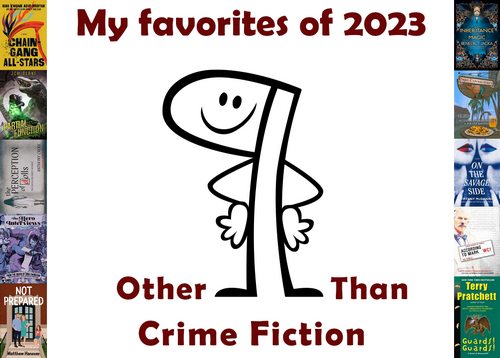
Back when I started this site, I knew the content would be largely “genre”-oriented. I’d have wagered the content would be roughly 1/3 Mystery/Detective fiction, 1/3 Urban Fantasy, and slightly less than 1/3 SFF, with “non-genre” fiction, humor, and non-fiction being enough to make my one-thirds just an approximation (honestly, if you asked me what I read regularly, that’s pretty much how I’d describe it today). Actual numbers show that’s wrong—it’s typically almost 40% Crime/Thriller Fiction, the rest of fiction is around 30% combined. This is just a long-winded way to get to these two points: because Crime Fiction takes such a big chunk of my reading, it gets its own “Favorite” list, but none of the others really garner enough numbers for their own.
When it comes to this particular list of favorites this year, it was harder than I expected. I got it down to 17 with relatively no problem. But trimming those last 7 was difficult. I waffled a bit—and considered a top 15, but I talked myself out of it and have a list of 10 favorite non-Crime Fiction Novels of 2023 that I really like. Hopefully, you will, too.
As always, re-reads don’t count—only the works that were new to me.
(in alphabetical order by author)
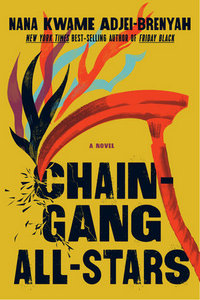 Chain-Gang All-Stars
Chain-Gang All-Stars
My original post
If there’s a book I’ve recommended more frequently this year, I can’t think of it. I’ve also bought more copies of it to give away than any other. At the core, this is a satire and critique of the American culture–particularly as it relates to sports, mass entertainment, and (most importantly) the carceral system. Pitting convicted felons against each other in gladiatorial fights-to-death, selling merch featuring them, turning them into Reality TV personalities between bouts…Adjei-Brenyah holds up the worst of the US to look at.
It’s a book about death—violent death at the hands of violent people who only hope to go on so they can kill again—However, in a serious way the book is really about life. It’s a celebration of life, a call to protect it, a call to see it for what it is. It’s a reminder that “where life is precious, life is precious.” It’s impossible to read this without being moved–perhaps to action. But it’s also a visceral and exciting read that can entertain you without forcing you to think deeply about what it wants you to.
(I don’t know why I knocked it 1/2 a star at the time…I can’t think of a reason for it now, but…)

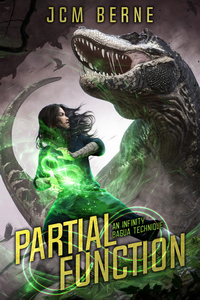 Partial Function
Partial Function
by JCM Berne
My original post
This has none of the socially redeeming characteristics of the above book. But it does have wuxia-inspired magical martial arts, super-powered dinosaur-like monsters, a John Wick/Bryan Mills character if played by Michelle Yeoh, and snappy dialogue. It’s a story about a retired warrior who gets back to work so she can rescue her kidnapped daughters and the wake of destruction that follows (a mighty wake it is, too). And it’s just fun from beginning to end.

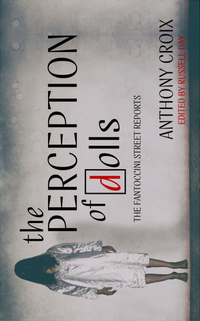 The Perception Of Dolls
The Perception Of Dolls
by Anthony Croix, Edited by Russell Day
My original post
I did an inadequate job of describing this book and what I was blown away by in 15 paragraphs. There’s no way I’m going to manage it in the 1-2 paragraphs I give myself for this.
I’m dazzled by this book. I was hooked to an extent I’m not used to. I was captivated. I was (at least momentarily) obsessed with it. That’s worn off in the 50 weeks it’s been since I’ve finished, but it would take me no more than 5 pages of a re-read to get back to that. This is a recounting of one investigative reporter’s look into a triple homicide and attempted suicide in a home, the paranormal research that occurred in that home decades later, and the very strange (to put it mildly) things that happened to everyone involved in both of those things.
Russell Day takes you on a ride that you will find difficult to articulate (which is fine, he does a fine job of it on his own) and that will linger in the back of your mind for a long time.

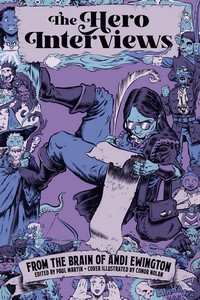 The Hero Interviews
The Hero Interviews
My original post
The child and sibling of heroic adventurers, Elburn Barr, has taken a different path in life—one fit for someone with his particular set of skills (or lack thereof). He is a Loremaster—no spells, weapons, or danger for him, thank you very much. At this point in his life/career, Elburn has set out to understand what makes a hero tick—what is it that drives them, what early influences molded them, how do they keep going on? Does it vary from type to type? Are Barbarians made of different stuff from a Cleric or a Thief? What about a Ranger or a Wizard? In addition to interviewing various leading examples of each type of hero, he talks to non-heroes, too. Like a farmer whose farm was saved(?) by some heroes from a dragon, the curator of a hero museum, people who run/design dungeons, etc.
This is a novel trying to look like a series of comic episodes/scenes/lines. It takes a while to see the plotlines emerge—it really does seem to be a light-hearted look at D&D clichés, stereotypes, tropes, etc. at the beginning—but eventually, you start to see the story arcs emerging and even start to see the protagonist grow and develop. That’s something I didn’t expect to see when I started reading this because I did think it was just a series of comedic bits. It’s hard to tell if Ewington is more interested in telling a story or making his jokes—in the end he gives you enough of both that the question is academic.

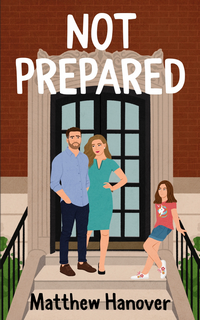 Not Prepared
Not Prepared
My original post
Hanover’s fourth novel is the first to have a protagonist outside of their 20s, and the added maturity pays off. While this book is at heart a Rom-Com, the romantic story takes a backseat to the love story between the girl who needs a family and a bachelor who didn’t expect one. There’s still plenty of “rom”, and a good amount of “com” of a handful of stripes (particularly when it comes to a single man being thrust into dealing with a young girl at the cusp of puberty)—but there’s a lot more, too. Told with Hanover’s trademark wit, charm, and grace—prose that moves so smoothly you don’t realize how long you’ve spent sucked into his book. The emotions are real and grounded—both positively and negatively. His depictions of anxiety really impressed me, and there are scenes that got me choked up.

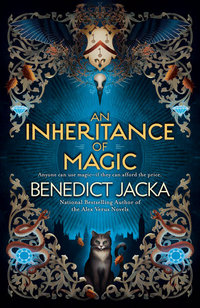 An Inheritance of Magic
An Inheritance of Magic
My original post
Any fears anyone had about Jacka’s post-Alex Verus career should have been assuaged by this book. It’s an introduction to a new kind of magic, a new kind of magic society, and a protagonist who is so different from Verus that you wouldn’t guess that Jacka wrote it if you didn’t have his name all over the place. This is kind of the reverse of the Hanover book—Jacka moves on from a mature character who knows his place in the world to one who is immature, unsure of his own abilities, and a complete beginner to the magical society of England (and, presumably, the rest of the world). And Jacka nails all of it. I couldn’t believe how easily I took to this world and I anticipate getting more immersed in it.

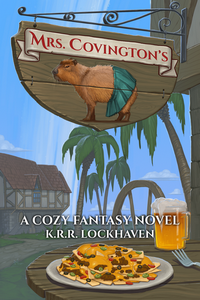 Mrs. Covington’s
Mrs. Covington’s
My original post
The thing with Cozy Fantasy is that the plot comes second (if not tertiary) to things like character and atmosphere. Mrs. Covington’s shines here–it’s such a pleasant, comfy atmosphere that it trumps everything else. A treasure hunt with the staff of the friendliest bar this side of Cheers! might be the plot of this cozy fantasy novel. But the book’s core is kindness, community, optimism, and helping. Also, Nachos. Brought to you in a great fantasy world with a light and engaging voice, Mrs. Covington’s will leave you snug and content.

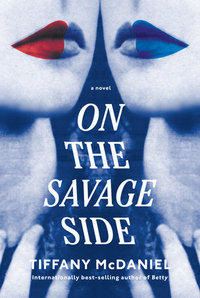 On the Savage Side
On the Savage Side
My original post
This was just a brutal read. Every time you get a glimmer of hope, a glimmer of a feeling that things might be okay for some of these characters—something snuffs it out. But there’s another source right around the corner. But there’s beauty in the darkness. And a drive to keep persevering shared by the reader and the characters. I wondered more than once why some of them kept trying—but they did. There’s a serial killer on the loose, and a good deal of the plot is about that. But this isn’t about the hunt for the killer or anything like that. It’s a novel about the women who may be his target and their fears about it. It’s also about the rest of their lives—how they got to the point where the killer might be hunting them and what might happen if they get out of there.
Like always, Tiffany McDaniels delivered a book that’s going to stay in my subconscious for a while—lurking there, making me rethink what I read from time to time. It’ll probably stay there until her next novel comes along (Betty‘s been there for a couple of years, and really only was dislodged by this one—and The Summer that Melted Everything is still there all these years later). It’s somber, it’s sober, and it’s difficult to read. But it’s so worth it in ways I cannot adequately explain. It’ll make you think. It’ll make you feel.

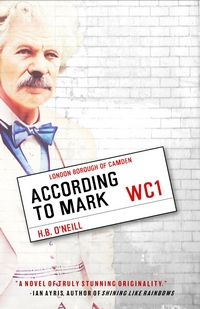 According to Mark
According to Mark
by H. B. O’Neill
Unlike the first 8 books on this list, I haven’t written anything about this until now. The pitch I was given about the book was, “It’s about a love affair gone wrong and a guy who’s obsessed with Mark Twain who becomes a voice in his head that eventually leads to Twain pushing the fella towards suicide.” I don’t know if this makes it sound appealing to you or not. So let me say this: If Chain-Gang All-Stars is the book I’ve recommended most this year, then According to Mark is in 3rd or 4th place. Given that I read it at the end of November, that tells you how much I’ve been talking about it lately. It’s comic. It’s dark. It’s disturbing (on more levels and in more ways than I can describe). There’s a fantastic and real love story in the center of it. It’s heartbreakingly sad. If you’ve read anything like this before now, I’d be surprised (and I want to know what it is!), but you’re going to want to read this when it’s published soon.
There’s more I should say, but I’m going to do it in a longer format.

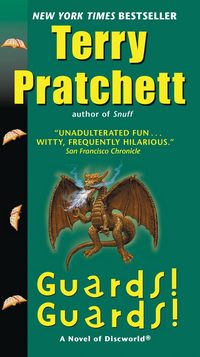 Guards! Guards!
Guards! Guards!
by Terry Pratchett
I spent some time earlier this fall asking for recommendations to get me to give Discworld another shot—and overwhelmingly, this book was recommended to me. Everyone who did that was utterly correct. It’s one of the best mixes of story and comedy that I can recall reading and I can see after a re-read or two (which it’ll almost certainly get from me) that at least one book in this series within the Discworld series is going to end up in my pantheon of comedic greats. I’m working hard to ensure I get to the rest of these in 2024 because now that I understand what I was missing with Pratchett, I don’t want to miss out any longer.

![]()






 Grab a book, any book.
Grab a book, any book.